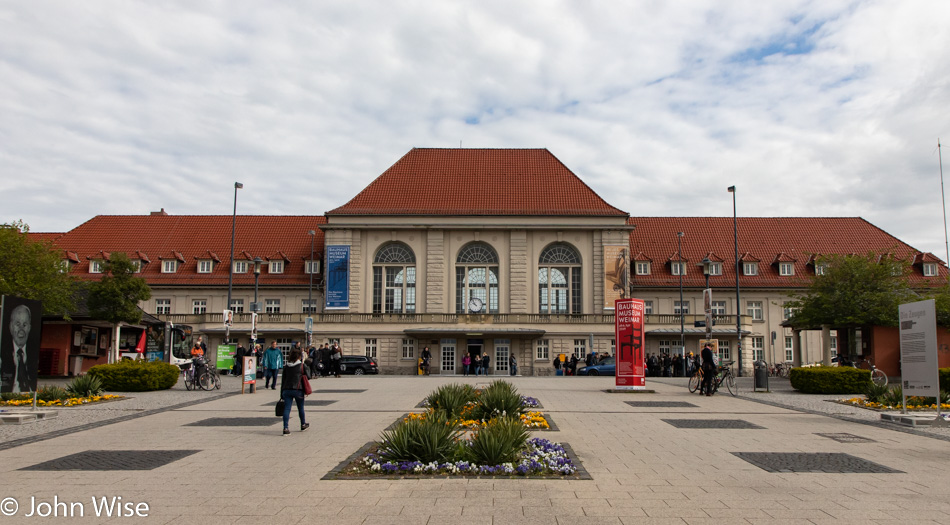
I feel overwhelmed by my love of German bakeries and their breakfast offerings with an amazing selection of bread and sandwich preparations. Today I get to choose between three bakeries, all within about 50 meters of one another, and that doesn’t take into consideration that I have another three within the train station that is off to my left. While I was ready to go to Weimar early, I still needed to grab a bite to eat.
The first bakery I passed was the one I ate at yesterday, so I’ll skip it; the second bakery focused on bread and sweets without sandwiches. So it was the third one called Heberer that’s been “Fresh” since 1891 that ended up as my choice. The flax, sunflower, and pumpkin seed roll with salami and a kind of cream cheese grabbed my eye, and so that was my Frühstück. I nearly asked for it to go when I thought better of that idea, and since I do not need to be in a hurry, I asked to have it there with a cup of coffee.
Instead of hoofing it with breakfast in hand, I’m allowed the indulgence of sitting down, listening to the espresso machine, the murmur of low voices with no one ratcheting up their pitch with squealing enthusiasm, and strangely enough, not a single cell phone is out or audible text message coming in. In the little over a week I’ve been in Germany, it’s been rare to see someone with a computer unless it’s on a train. This idea of the separation of work and private life still exists here in central Europe.
A group of maybe two dozen preschoolers just walked by hand-in-hand on their way towards the train station; they were here to play on the temporary beach volleyball courts. Yesterday, workers were out here setting up a large box that they dumped a few tons of sand into, accommodating two courts and, next to that, a couple of tents for food and alcohol. This morning though, the sandbox belongs to the kids who are too short to play proper volleyball with a net that towers above them, but that doesn’t stop them from hysterical laughter while out here having fun.
There are people waiting here in the bakery with bags, not their backpacks or day bags for shopping, but their travel bags. I can’t emphasize enough how civilized rail travel is compared to using airports where human cattle are quarantined in a secure area. Being free to choose any one of the many businesses both in the train station and in the immediate vicinity is really a luxury worth having. It’s sad that I should have to lament the state of travel in America, but when I was younger, I thought using trains was an inconvenience to getting to where one needs to go in a hurry. Now I see the error of my petulant youth and the shortsightedness of a society that only concerns itself with productivity at any cost instead of realizing that a life well-lived has its own merits.
My train arrived at the station 15 minutes early, and when I boarded, I was the first person on. With less than five minutes before we depart, a group of teens, being teens, boards the train as a herd of wildebeest, allowing the dead to waken from the ruckus. As they find their seats they magically discover their sense of decorum and settle down to minor antics, but are mostly quiet.
I nearly forgot to mention that it was under 3 Celsius or 37 degrees as I hit the street at 8:00 this morning. I did not come prepared for nearly freezing weather. I need not worry too much, though, as in little more than a week, we’ll be on our way to the Dalmatian Coast, where it is 20 degrees warmer right now than it is this far up north. As for the state of the sky, it’s the usual mix of clouds and blue patches that promises just about anything regarding the weather.
I’m not in Weimar five minutes before an old lady on the opposite side of the street collapses. She’s about 80-something, and before I get over to her, five other people have rushed to her side, though no one is calling emergency services. She is unresponsive, although her eyes are mostly open. There’s no drooping face, but there are also no words or acknowledgment that any of us are here. It struck me how lucky she is to be walking somewhere there are others who might help if only they would call an ambulance and actually start helping. It took a woman running out of a local pharmacy to take action. I am filled with the heavy realization that someday, this very well could be Caroline or I and that there might be no one around to help. The ambulance is here now, and the lady is on her way to the hospital.
In old town now, I walk along Schillerstrasse happening upon two cello players offering up a street-side performance in exchange for a coin or two thrown into the case before them. Behind the buskers is Hoffmann’s Bookstore founded in 1710. It’s a polite, refined culture here in Weimar compared to the rush in Berlin or even the comparative speed of Erfurt. Is the population here older? The pace is certainly a leisurely one.
Dropped in at a nearby paper shop and bought my first fountain pen; seems appropriate that I should buy a writing instrument in Weimar, where so much literature has been penned. With the deep imprint of Goethe here there’s a creative legacy that has remained strong in this historic city. While not a literary movement, there’s also the mark of Walter Gropius on Weimar, as this was the city where the Bauhaus movement got underway.
There’s a problem with all of this history to be found in Weimar, where I’ve come to write today; I could easily be distracted by the abundance of cultural significance that is right before me. Other than the Nietzsche Archive, I will try to remain focused and plod along the various routes that lead me through a city that played host to Kandinsky, Klee, Franz Liszt, and Friedrich Schiller, to name a few of the principals who left their impact upon society.
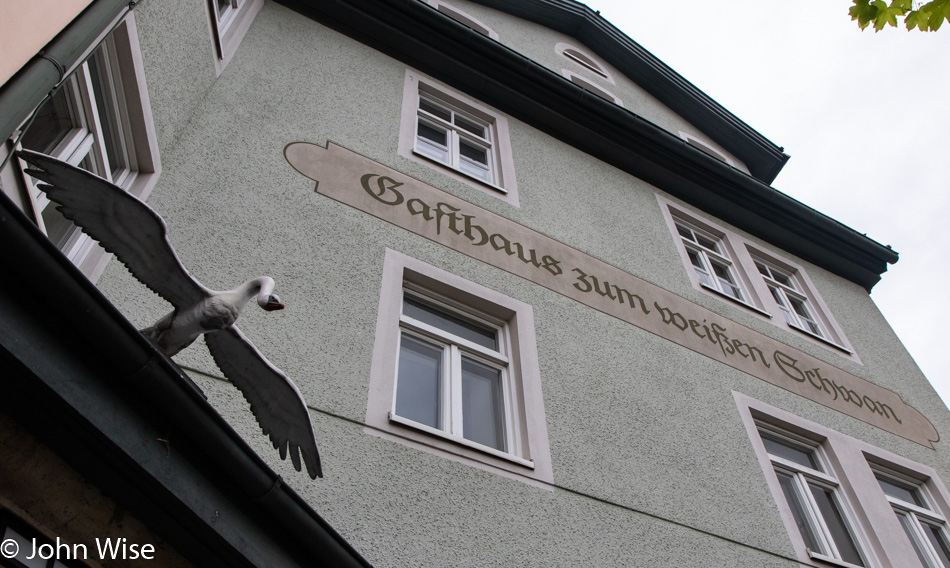
Gasthaus Zum Weissen Schwan where “The white swan welcomes you anytime with open wings.” Those were the words penned by Johann Wolfgang von Goethe back on 18 February 1827 to a friend about his favorite restaurant in Weimar. This place has stood there for more than 450 years, and outside, it looks nearly exactly as it did back in the 16th century. Did I choose this place for its history? No, I simply asked Google for the list of German restaurants in Weimar, and this one was only 90 meters straight ahead, so convenience chose it. It also allowed me to step out of the cold.
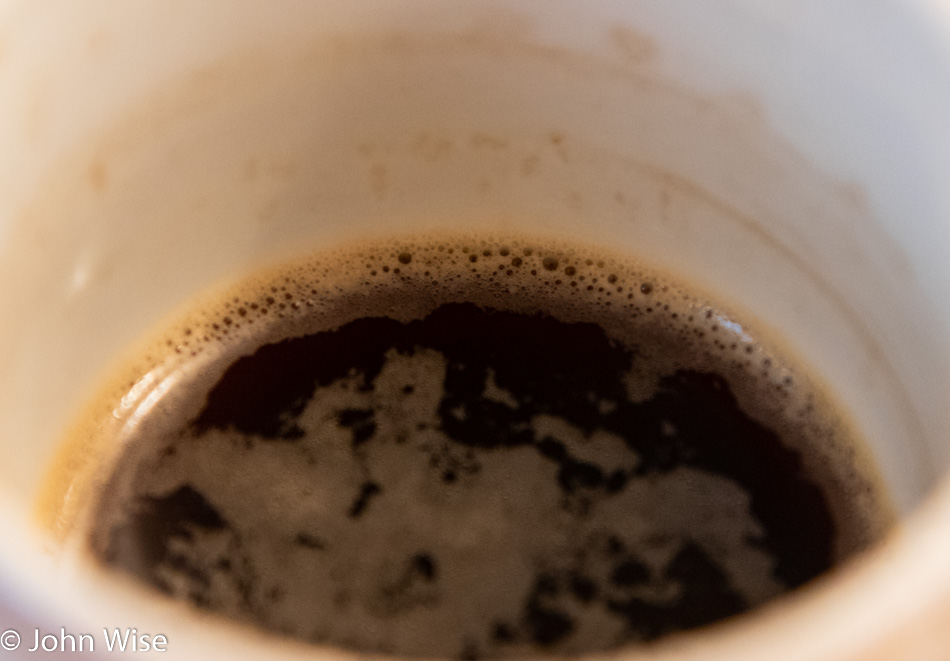
The bitch sitting next to me is as bitter as my coffee and is everything I didn’t like about particular Germans when I lived in Frankfurt. As a matter of fact, I have this feeling towards many of the people I run into who are my age and older here and in America too. The German word is Verbissen, and it translates to grimly, clenched, cramped, pinched, or otherwise wound up too tight. The woman here is ganz verbissen. It’s not a gender-specific thing either, as many a person in Germany have sticks stuck sideways up their backsides. I consider moving tables so I’m not in such close proximity to the negativity she’s exuding, but I’m sitting under the image of Goethe and want to believe my table neighbor inspires my sense of Sturm und Drang.
I can’t let this go without a nod to Faust, considered by many to be Goethe’s greatest work. While I’m without my own devil to the best of my knowledge, I am tormented by my desire to know more, but not at any cost. I’ve been searching for answers for a solid 40 years by now, and yet the sense and passion to continue the exploration burns brightly. I do not believe I’ll find redemption or condemnation from the deities for my lack of godlike wisdom, as to how would anyone among us ever know more than would allow us to ask more questions?
This should bring me forward to Nietzsche, but he’s been growing mold far away in the back of my mind where I’ve not seen him for an eternity. Somebody once told me that God had killed him. To live by the force of doing and to be in the moment was a concept I had to embrace early in my life, though the imprint of institutional damage had already been inflicted upon my sense of finding an explanation and justification for how I might do and think about things. Unloading the baggage of conditioning where the community goal was the installation of deep-rooted stupidity without offering me tools to recognize day from night was like the regime that steals the very life of the enemy, leaving the combatant dead and unburied where he fell.
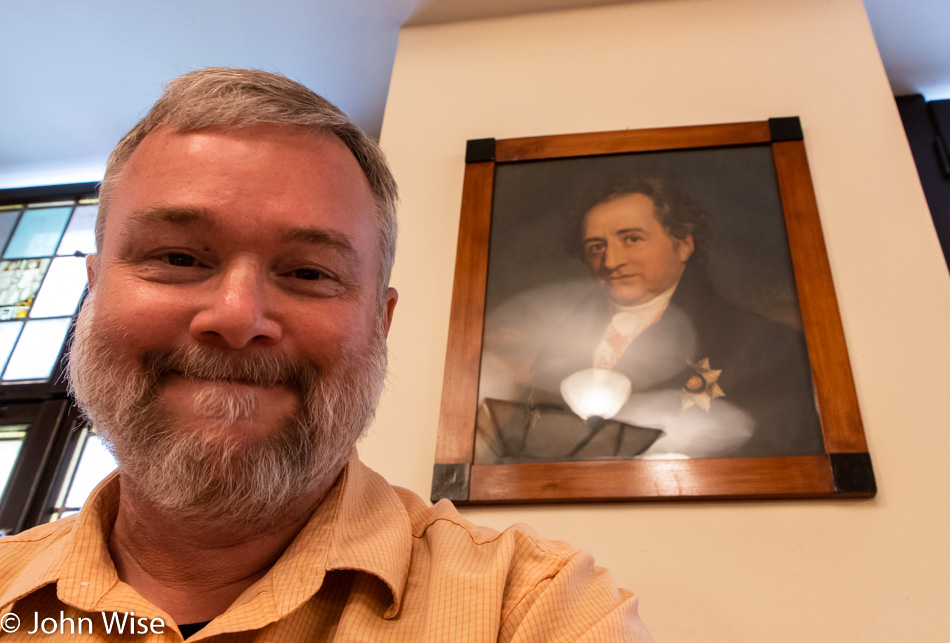
We are supposed to aloft ourselves from the muck of being, but what has been achieved when that elevation takes us into the sewage of knowing that’s where we are at the bottom of it all? I hate the term “realist,” though recently I described someone as a harsh realist, and using the word that way, I feel it strips away the optimism laying the path for the cynic to wallow in the shit of doing and accomplishing nothing that really matters to themselves. I identified readily with Nietzsche’s disposal of the ego as a thing that had tangible qualities as opposed to it not really being there. I am without the attributes others want to foist upon their perception of my sense of going forth in my own journey. But they care for nothing; they must live and die with their characterizations.
You might believe that my generalizations of character, or the lack of it, are judgments of my grading of those I suggest are without meaning. You will have misread this, for what I really want to say is that I find it tragic how so many can breathe without a greater purpose of discovery. How does one cast aside the eyes that find patterns in the colors and shapes of nature or the ears that are seduced by the sound of life and the occasional elegance of words? We are certainly the blinded and deaf ape actors of a stage play set in folly.
“Do not give in to tyrants” might be the greater lesson from William Tell, penned by Friedrich Schiller back in 1804. I’d venture that the majority of humanity only knows the part of shooting an arrow at an apple that sits upon someone’s head, but that head is his child’s, and the person demanding this frightful action is the Governor who represents the oppressive Habsburg Empire. Of course, Schiller also wrote Don Carlos. Some say this play is part of the basis for Star Wars, though it was about King Philip II of Spain. Should you not be familiar with the story of King Philip, it was during his reign that Spain reached the pinnacle of its empire with territories held on all continents. One country in particular still bears its mark: the Philippines. The thread that holds Schiller, Nietzsche, and Goethe together is that of personal freedom and throwing off the chains of convention, religion, and tyranny. Things we all take for granted in our modern age of knowing a lot about much of nothing.
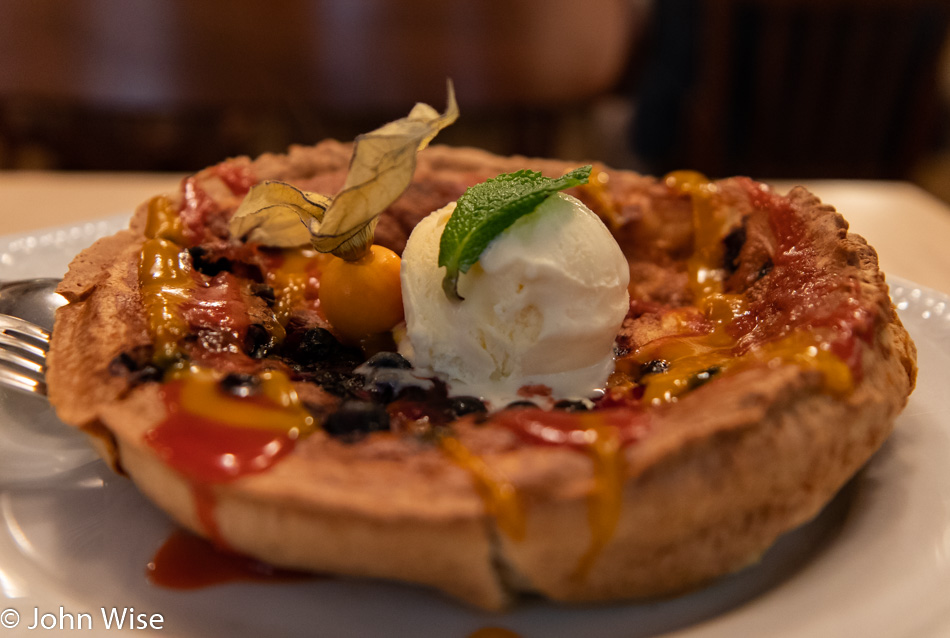
Should you begin to think this day will be primarily about the machinations of my mind, then you forget that there’s the machine that is my stomach that must find the lubrication from things classified as yummy. From the Tafelspitz, said to be a favorite of Goethe’s, to the dessert, which is also claimed to fit the category of one of Goethe’s favorites, I will leave the White Swan satisfied with a great meal and an abundance of writing while I nursed a large bottle of water and my coffee that was well cold by the time the last sip was had. It’s not every day I indulge in three-hour lunches, but when I do, it’s with Goethe looking over my shoulder while sitting in Weimar.

The Legacy of Tragedy follows humanity as we warp ourselves into twisted parodies of the Übermensch. We seem to have an apparent need to find the absurd and folly in our lives in order to create comedic theater that ends in suffering. Nietzsche attempted to warn us of our inherent shortcomings, nudging us to throw off the yoke of brand influences that were used by those who enjoyed the privilege that arrives with control.
We do our best to destroy that which we do not understand, and it would be the rare individual who was able to benefit from the words that Nietzsche wrote. You do not read Nietzsche as much as Nietzsche has read you. When you think you can agree with his tenets, you begin to realize that he pulled you into your own dogmatic beliefs that were premised on lies and deception in the first place. To read Nietzsche, one must not read him but become one’s self. If we are so lucky to identify through him the carnage wrought upon our perception by an education that was anything but, we could begin the journey into the discovery of being human.
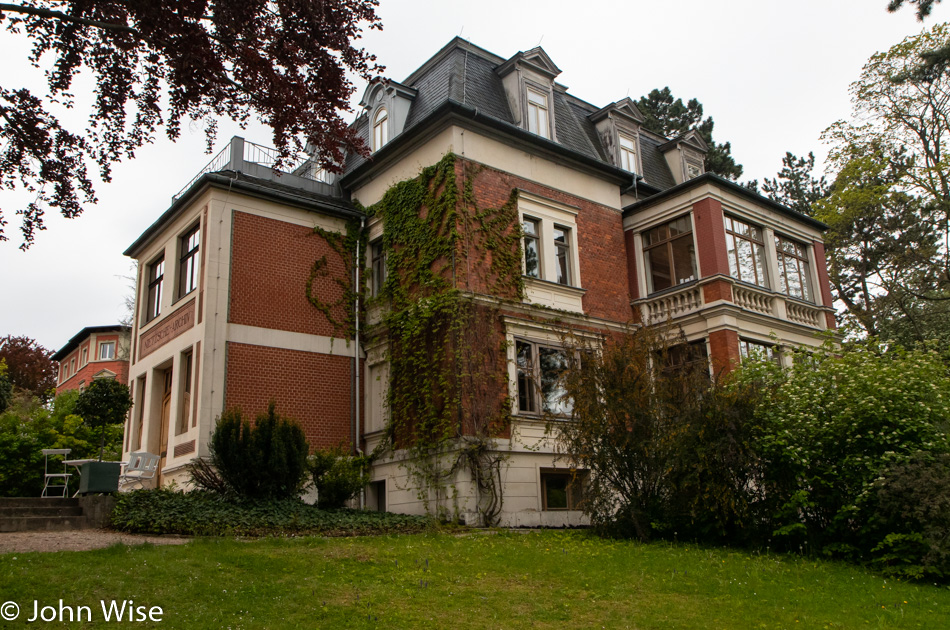
Some may say Nietzsche’s life stopped here at Humboldtstrasse 36 in Weimar back in 1900, but his teachings are still trying to exist through his philosophy while the madness that consumed his final years lives on in our age of distorted reality where clowns operate the levers and drive the lemmings over the cliff of real happiness.
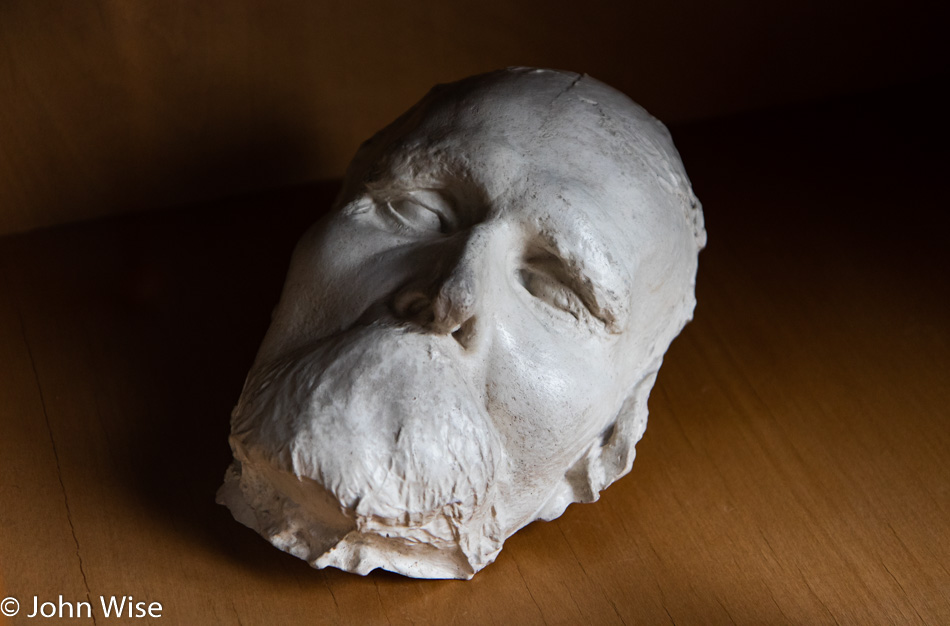
While mass murder leaves an indelible mark on a place such as Dachau, critical thinking leaves only fleeting glimpses of inspiration from the words others were able to distill from the exploration of their own skills. Just as I was looking for the essence of Bach in a church or Martin Luther in a monastery, I am here in the home where Nietzsche died, listening for the echo of his then-quiet mind, which had lost the fire that raged in his youth.
There is no hint of enlightenment to be found from simply being somewhere. We must cultivate a fertile place in this nebulous thing we call mind. Even after we believe we might have fertilized that soil of imagination, the seeds are not certain to sprout. Writing down our thoughts, scattering pigments into patterns abstract and recognizable, or linking strings of notes into tonalities that find the ear, we can only hope that maybe a single plant will have the strength to grow large, to nourish us, to offer a new stronger blueprint for the future so that generations to come will still benefit from that one spectacular moment in history when nature evolved something of great importance.
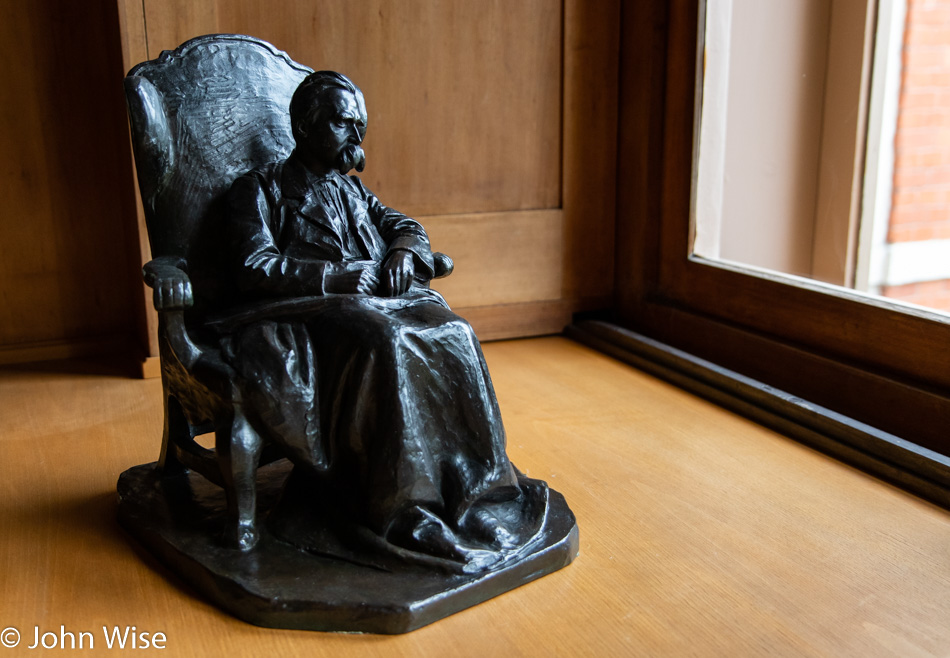
I am sitting by the window below the rooms in which Nietzsche spent his final days. From where I sit, I’m looking at a view much as it would have appeared 119 years ago when Nietzsche, steeped in the fog of relative insanity, would have listened to the song of the birds and watched the leaves swaying in the breeze. Maybe he’d simply gone deeper within himself back on that fateful day in Turin, or maybe he was truly long gone.
Goethe had Schiller, Humboldt and Darwin had their contemporaries, Gropius was surrounded by artistic genius, Nietzsche had Peter Gast (Heinrich Köselitz) and, for a while, Richard Wagner, while Feynman was able to chat with Einstein and Niels Bohr about ideas of the time. I am a layperson, not an expert in anything except my primitive curiosity that allows me to stumble into wondering and wonderment. Where are the thinkers within my community? Am I such an outlier or so abstract and unrefined as to attract the derision of those I cannot find or who have found me and decided I wasn’t worthy?

Oh, you are picking up on a hint of insecurity? Of course, you are because it is my lack of interest in that which interests others that betrays my desire to escape this partially hermetic existence in the confines of a skull. Don’t believe it’s all doom and gloom in the intellectual sharing experience of my world; there’s my junction with nature when, without the voices of others, I revel in the caress of sheer beauty, be it among the thorns of the cactus or the sulfurous water and gases that belch out of a corner of the state of Wyoming. The grandeur found outdoors in wild places has been known by my senses to cause tears to emerge from eyes swollen with the profoundly incomprehensible complexity of it all. I only wish the same for my mind when exploring the landscape within it.
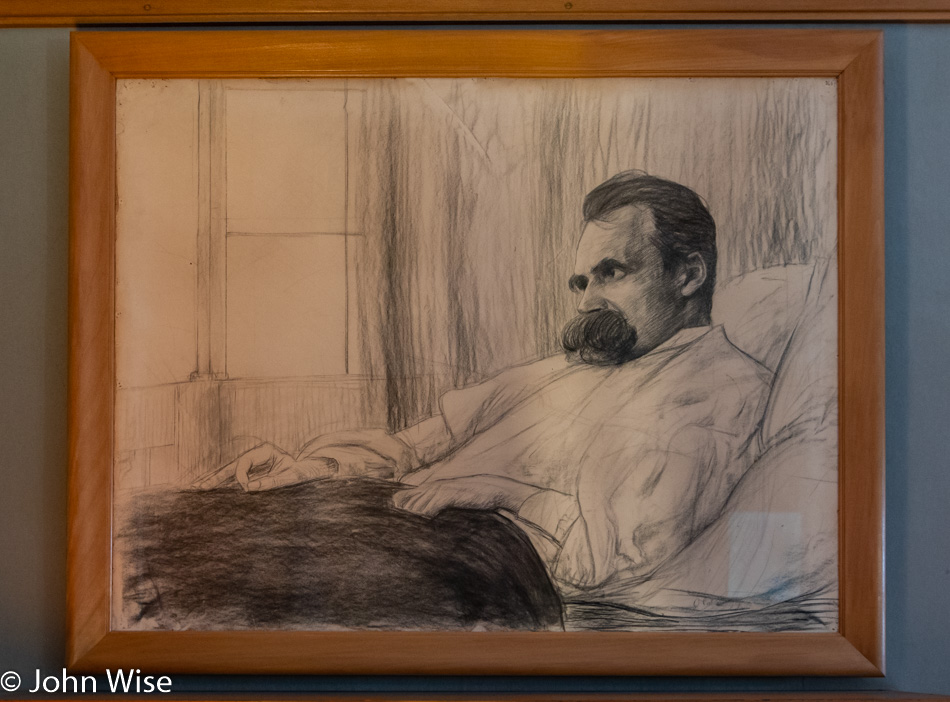
I’ll have to leave soon, and I’ll have to leave only with what I came with. I have not found a thing besides the time to be quiet and allow my fingers to send tiny gestures to keys conducting a small electrical current to a powerful piece of silicon running on stored electrons in my computer that becomes squiggles of black photons that under certain circumstances are able to convey information. I suppose having the skills that allow me some level of mastery of this form of sharing should be cherished for how rare it is, as not everyone believes they have something worth writing at the risk of others recoiling or simply disregarding the import of what was thought worthwhile. So I should continue to write as one never knows what they’ll stumble upon.

One thing is certain: while others busy themselves groping for trivialities found while being the tourist, there will hopefully always be those who travel the mind far and wide looking to turn over the neurons that were randomly organized by the riot of information that fell into their senses. Extracting the precious metals and minerals that have been forming under the tremendous pressure of expectation and disappointment may yet one day produce something valuable. Time to walk again to explore another aspect of where I’m going.
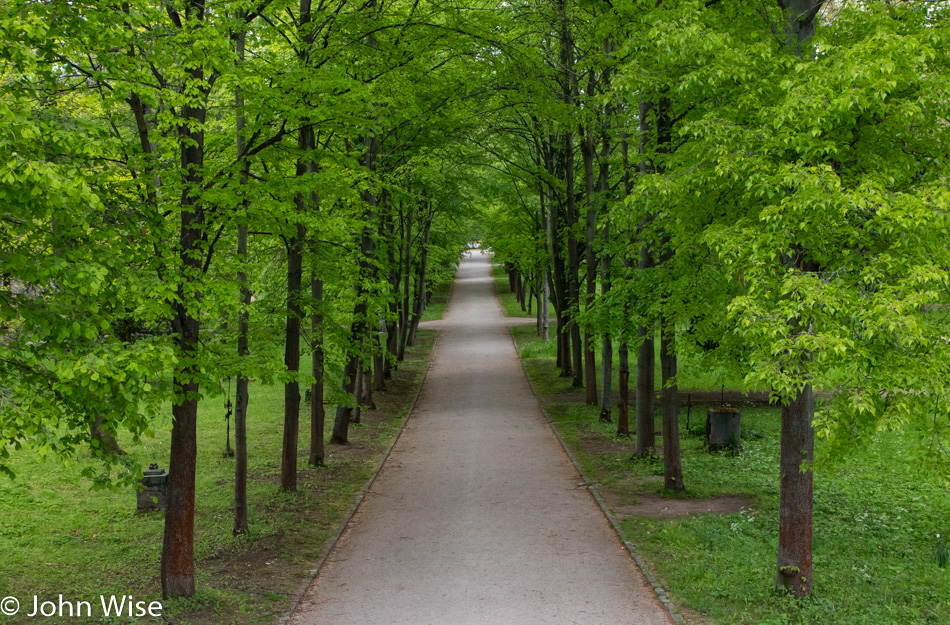
I’m going to the dead. The living are few here as I sit in the garden of those who have visited death and remained there. Only a few tell me stories that are able to convey more than the moss-covered, rusting, and worn epitaphs that are now barely legible. Underground and in boxes, I am able to approach the hidden corpses of both Goethe and Schiller, who rest in eternity next to one another with visitors who pay $5 to be a personal witness who can assure others that both are still dead to this day. And while Schiller is not Schiller in the casket that bears his name, it is the memory and recognition of the idea of his resting place right here that holds import. Do not busy yourself with the details of the specifics because the dead long ago lost that sense of being attached to the order of things. One can learn a lot from a dead person.
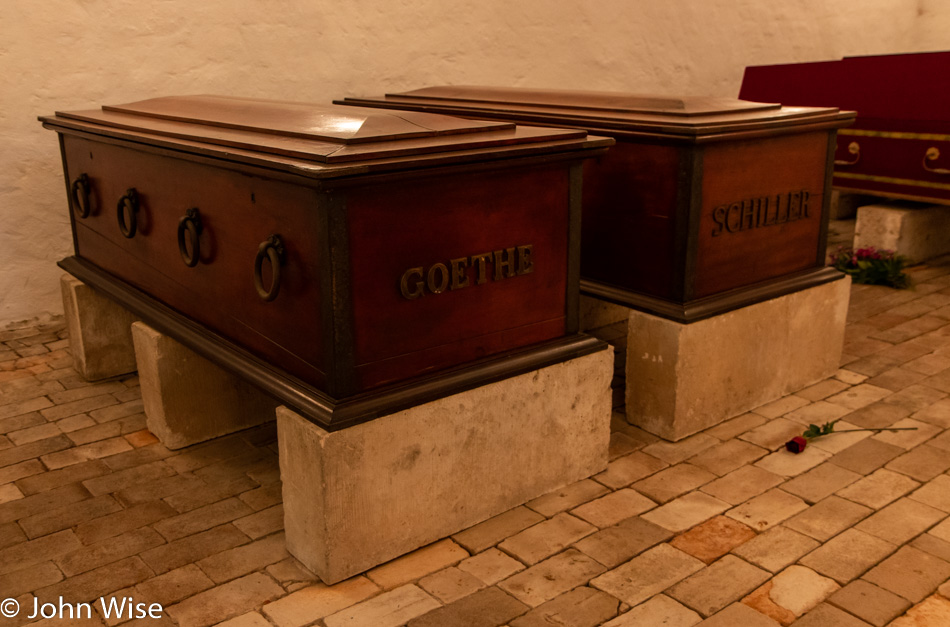
The rest of the formerly living barely earn a passing glance from the likely descendants of those who now populate this wooded city of solemn respect. I don’t mean to be ironic in my irony, but the similarities to the dwellings of the presently living are suspiciously reminding me of those who are apparently comfortable in their death. There is no anguish, no more struggle, or difficulty waking to go to that job that is loathed. I say this not tongue in cheek, as a resignation to be dead in one’s life is much like that of the former person who effectively chooses to be dead in the afterlife. For all that we know, there is only the universe of the ravenous worm who devours our physical being while the mind leaks out of its cranium to be absorbed as so many nutrients by the soil thriving with bacteria.
Bacteria have been present for billions of years, and their network of genetic communication is a bit of a mystery to me while I sit in this cemetery, but one thing is clear: long after I’m gone, the bacteria will have enjoyed the feast on whatever part of me is left, be it ashes or juicy wet rotting guts, I can know well that my contribution to their kingdom will have fulfilled my role to feed its populations. In this sense, we live in a symbiotic relationship where bacteria cultivate the soils tending to their health, which allows this other layer of life to benefit from its labor while all around it, we go about our brief existence believing we are at the top of the chain. We are delusional in our belief in the illusion that we are somehow important to things; we are food.
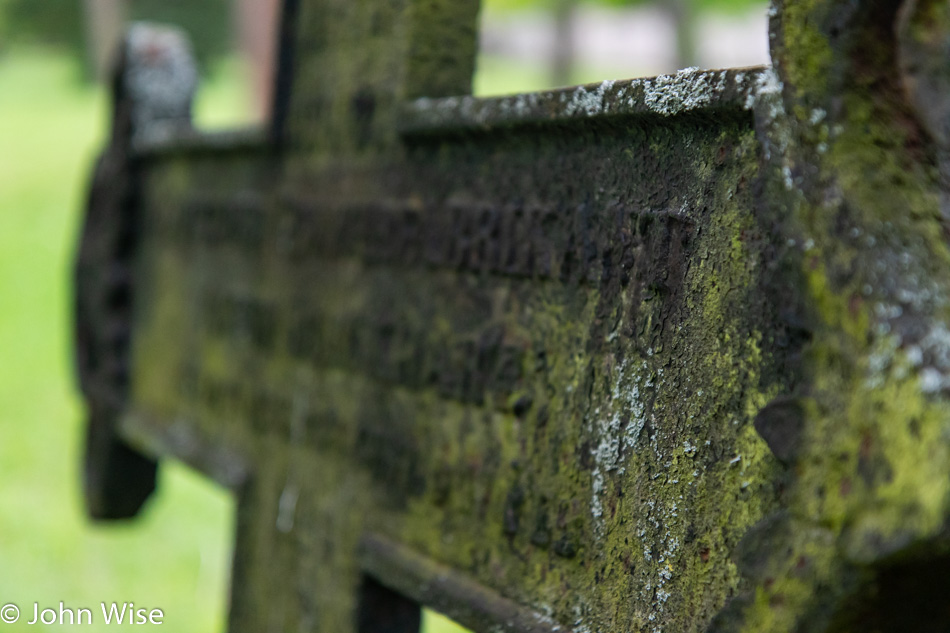
So if we are food in a chain of life, then what is this output of the creative activity of humanity? Can it be food for something called knowledge? As we feed this knowledge our experiences and observations while its wisdom grows, how does the symbiotic nature of feedback loops then benefit us? If we toil without reward, then our payoff might be that we were instrumental in the advancement of our species, but if our reward is greater awareness of the bigger picture of why life has risen within the universe, then maybe we can fool ourselves into believing we ourselves are gods.
Are the gods simply mortal beings who have transcended being forgotten as food for other things, while the ubermensch lives on godlike in the remembrance of what they lent to humanity? A single cell may seem small and insignificant, isolated by itself, but to the molecules that inhabit that universe, the cell is heaven and hell as it is where they will live and die. To the atoms that live in the orbit of one another, thus forming molecules, the idea of the cell is a faraway dream state where the fantasy of one of the self-proclaimed enlightened atoms believes they have answers far beyond their simple nature. Meanwhile, the protons and neutrons see the electron circling them like a moon in orbit and can thank their lucky stars that they are safe at the center of their universe.
Where does that leave us? Relatively aware of the matryoshka doll nature of our existence, except we cannot perceive what our organization of information feeds beyond the immediate product of our labor and the tools and conveniences that stem from them. I can’t help but feel as though I’m missing part of the picture or outer layers, though I’m relatively certain it doesn’t involve some pious entity that would waste its time casting judgment on a piece of meat. That would be as silly as us casting judgment on the bacteria that finished off Mr. Goethe with a resounding smack of the lips at just how tasty he was after a life of getting fattened up on all that pork.
Time to rejoin those who claim to be living here in Weimar and elsewhere. Though before I leave those who are more dead than I am yet, I’d like to say that maybe it won’t be so bad when my day comes to move into the woods where life is different than it was before it was gone.

I’m hanging out at Baroness Caroline Jagemann von Heygendorff’s house down the block from Goethe’s place. This singer and actress was famous in her day and lived in this incredibly big house that is now a restaurant named in her honor: Jagemanns Restaurant. The young man who served me earlier at Gasthaus Zum Weissen Schwan told me about their second restaurant in town, which is, you guessed it, right here. This also serves as his second job.
After crossing the old town on my way back from the cemetery I was looking for a coffee, but the city of Weimar is not somewhere you are going for a cup of java in a cafe after 7:00 p.m. While making my way to a waffle shop that promised to have coffee, I was thinking that I’d get there and have to ask for it to go when what I wanted to do was sit down once again for yet more writing, should it be possible to ring something else out of cramping hands. Okay, they’re not really cramping, though all this writing comes at the expense of walking a lot. Considering my indulgent lunch that included potatoes and a pancake dessert, I really should have mounted some serious attempt at a brisk walk. Instead, there is more sitting, more writing, more diabetes.
With walking and spots for coffee all running on the thin side, it occurred to me that if Jagemanns isn’t too busy, maybe I can get this young man named Tim (I figured if we are going to be familiar with each other, I should know his name), to offer me a table in the corner where I could nurse a cup of coffee and maybe even write a bit more before I develop an appetite for dinner. While I visited the White Swan shortly after 11:00 when they opened, it was nearly 2:00 before I left, and after the feast, I was having trouble finding empty spots in my still full stomach. However, if I think about it for another few minutes, I’ll soon be famished; it’s the way I work.
On the one hand, it’s boring that I write of my culinary experiences, but on the other hand, they figure prominently in my day and my thoughts, and when tied to history, a region, a people, and their customs, the meal becomes something more than only taking care of caloric intake for the sake of remaining energized and alive. Once I’ve realized that I’ve said all that I can say about things related to my time in this restaurant prior to eating, I would like to transition to writing about something else. My sad reality is that I’ve already written so much that I’m drawing a blank about where I could go next. It will not be about the cup of coffee that is cooling as I sit here as the only person staring at a screen. With nothing else coming to mind, I guess it is time to get busy with the menu.
Just then Tim comes by and tells me they have wifi and gives me the password. I could opt to surf the net and goof off, but I’ve ordered my dinner and will consider heading back to Erfurt after that and a walk around town to burn some of the gratuitous calories I’m going to shovel in as I practice my own version of gavage.
The homemade ragout from boiled pork served au gratin with a thick layer of cheese was yummy. Tim brought me over a bottle of Dresdener-style Worcester sauce that I wanted to decline, but he informed me that this was a special former East German brand that is essential on my ragout, and he wasn’t kidding. This dive into Thüringian food is turning out to be a great treat that could only be made better if I were sharing it with Caroline.
Up next is the Rostbrätel with Thüringer Klöße or pork with dumplings. Don’t let simple descriptions fool you, as this is serious cuisine for the discriminating palate of a man who is trying to cultivate a fine sense of German food snobbery.
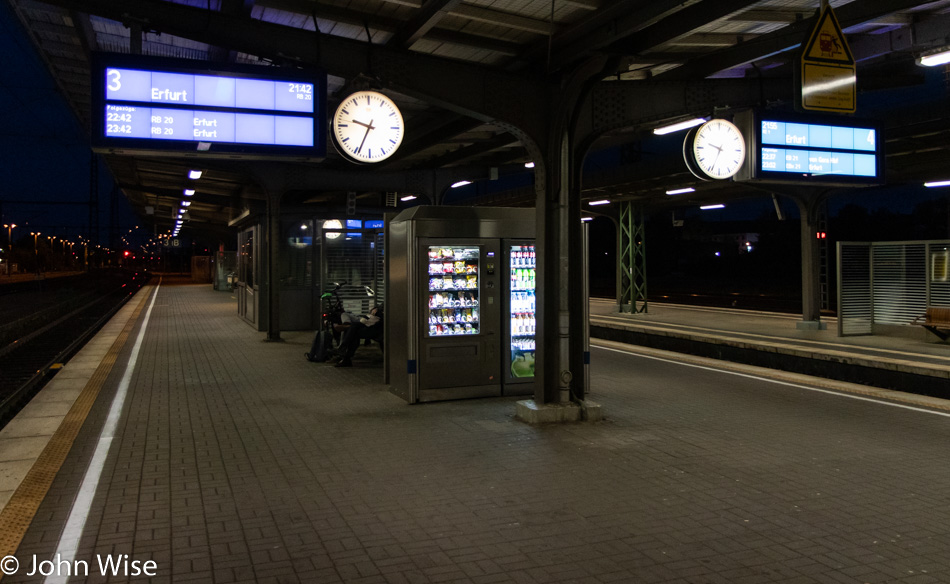
The day has been full of everything I wanted for this visit to Weimar and, more generally, Germany. Of course, I had dreamed that I would land back in Frankfurt so many days ago, and an insightful inner voice would spring to life, opening a channel to a cascade of musings for this blog that might catapult my thoughts into unseen territory. Alas, I am still the same voice in my head that I’ve been for some time now. Short of communicating gibberish, I’m not sure how to change the tone and maybe even the subject matter of what seems to flow from my brain. There are times I’d like to consider writing fiction, but for all I know, this is fiction, and I’m seriously delusional.
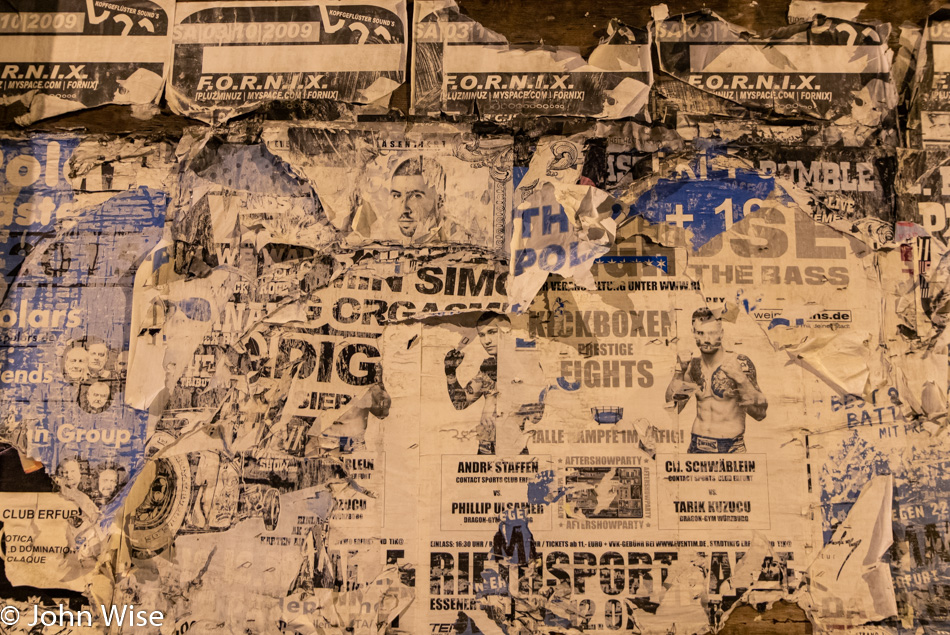
Fragments of the past remain with us long after their usefulness has been had. These tattered archaic reminders of who we’ve been often allow us to see where we’ve come from and just how far we’ve traveled. When we don’t recognize the writing on the wall anymore as being dead and useless, we join a kind of madness for the nostalgic, romanticized notion that those were the good old days. But like the rotting corpse buried within the earth, those things have become putrid and are on the verge of total disappearance. We cannot will them back to relevance. We must plaster over the past and embrace the inevitable march of progress, though we may end up kicking and screaming all the way to our grave to finally succumb to the reality that life will happen with or without us.